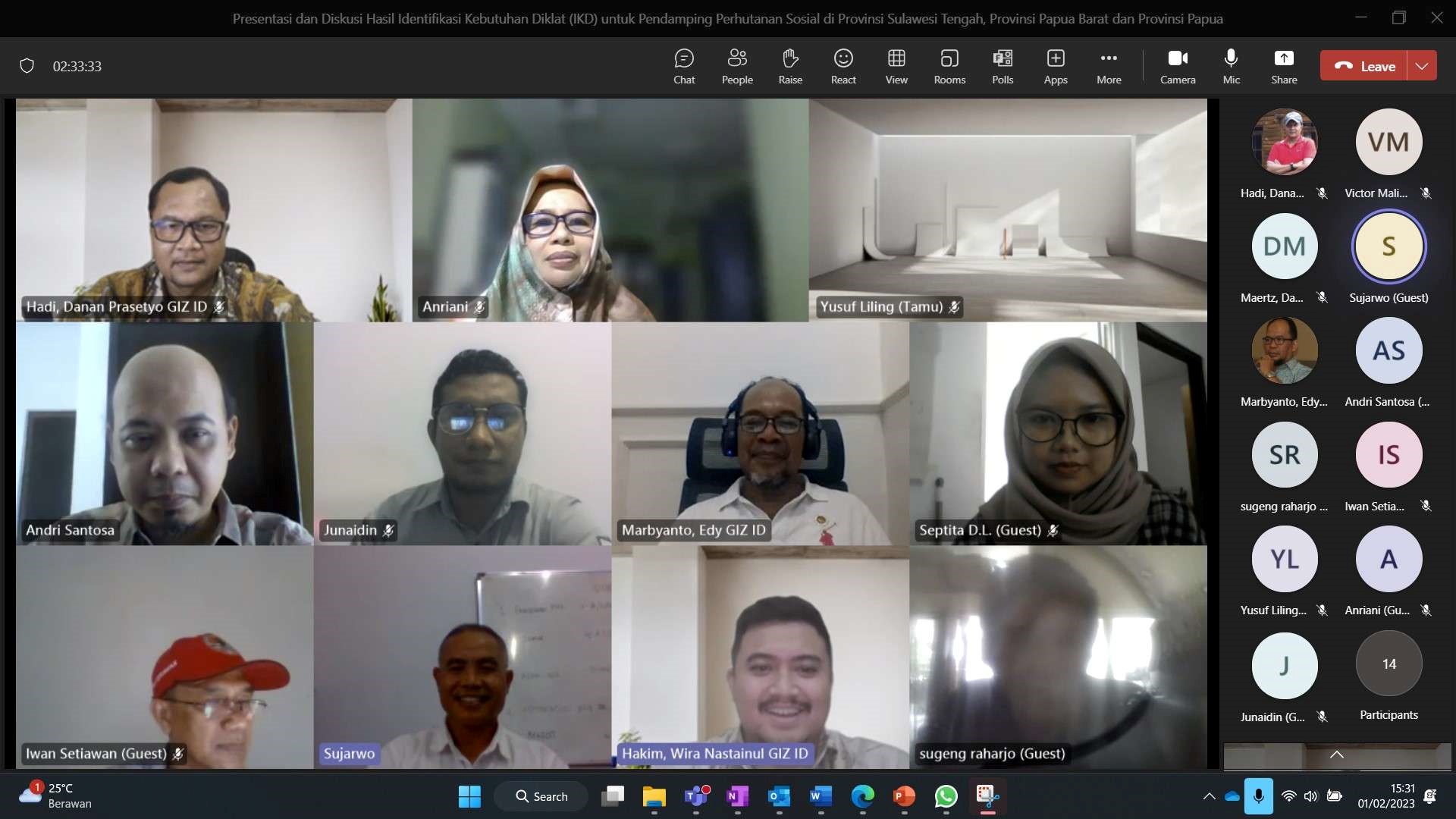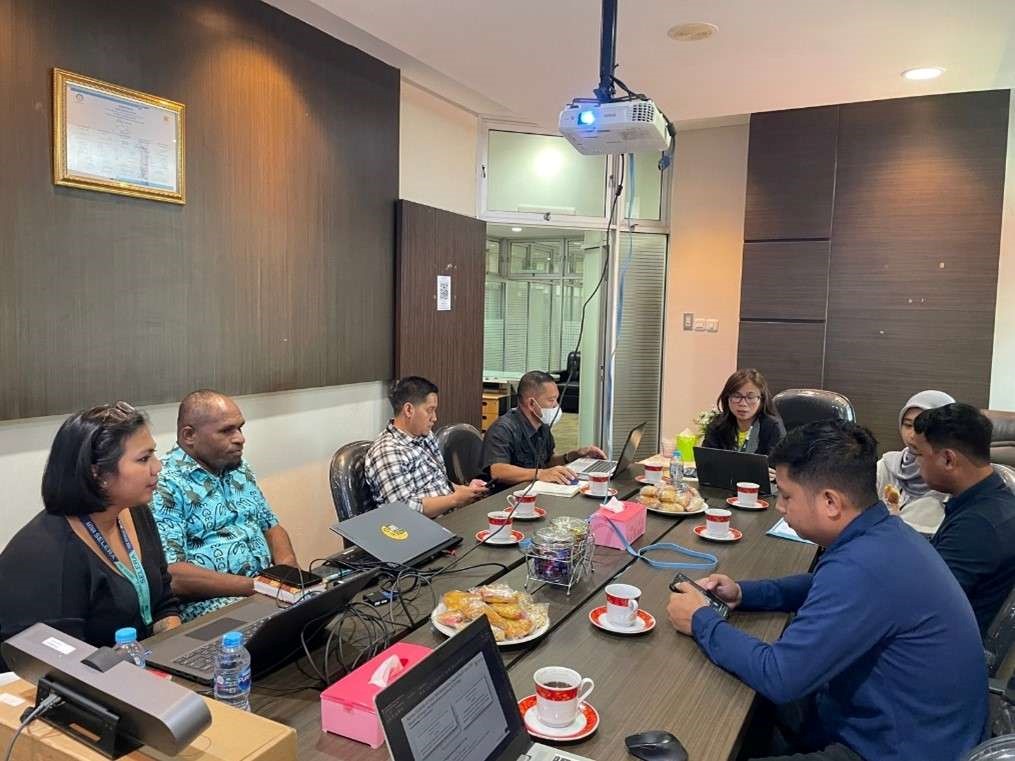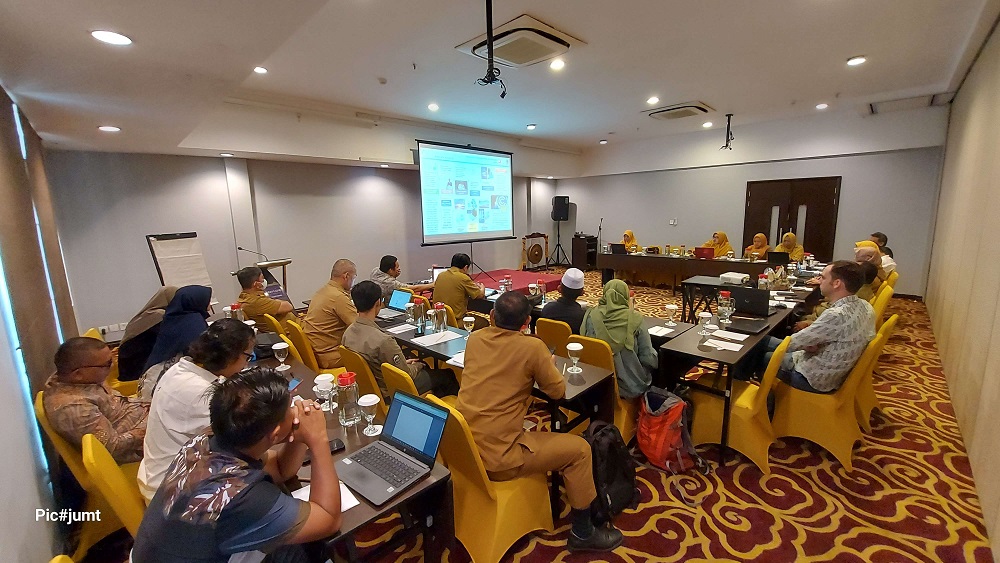FORCLIME
Forests and Climate Change ProgrammeTechnical Cooperation (TC Module)

Select your language

During the September - December 2022 period, FORCLIME completed a Training Needs Assessment (TNA) of Social Forestry Facilitators and Forestry Extension Workers, as well as members of the Social Forestry Acceleration Working Group (Pokja PPS) across three provinces of its working area, specifically: Central Sulawesi, Papua and West Papua. The results of this TNA are expected to be used as a reference by the Center for Education and Training for Environment and Forestry (Center for Human Resources Training for Environment and Forestry), as well as Environmental and Forestry Training Centers operating within the regions (Environmental and Forestry Training Centers), the Provincial Forestry Service, the Social Forestry Office, the Environmental Partnership and other stakeholders to develop capacity building programs for Social Forestry assistants and Pokja PPS administrators working within the three provinces.
The expertise competencies that are being studied in relation to Social Forestry assistants and forestry extension workers include:
1. Competence regarding the conducting of facilitation and counseling.
2. Managerial competence.
3. Technical competence relating to assistance for community members prior to their securing social forestry permits.
4. Technical competence relating to community assistance after social forestry permits have been secured, including institutional management, area management and business management.
On February 1, 2023, the GIZ Team presented the TNA results online to the Makassar Environmental and Forestry Training Center. This presentation is seen as important due to the fact that the TNA coverage area (Central Sulawesi, Papua and West Papua) makes up part of the Training Center’s service area. The results of the competency level study have revealed that PS assistants and forestry extension workers operating in Central Sulawesi Province generally have much higher levels of competency than their counterparts in West Papua and Papua. This generally means that the need for capacity building among Social Forestry assistants in Papua and West Papua is more urgent than capacity building for Social Forestry assistants in Central Sulawesi. The non-training issues that commonly arise during Social Forestry assistance activities encompass the remoteness of assisted areas, as well as problems relating to accessibility and limited operational budgets, which make it difficult to provide intensive assistance.
As a follow-up to this webinar, the results of the TNA will be presented at the national level at an event that will be attended by the Center for Human Resource Training for Environment and Forestry, as well as other by technical directorates in charge of Social Forestry at the Ministry of Environment and Forestry.
For more information, please contact:
Edy Marbyanto, Strategic Area Manager for Human Capacity Development

To demonstrate how renewable energy can play a role in meeting the electrical power requirements of office operations, as well as how rooftops offer an excellent place in which to install the solar panels required by solar-power systems, FORCLIME is preparing to install a solar-panel system at its office in Jayapura. Solar power is becoming an increasingly important option around the world and offers an alternative to fossil fuels that is a non-polluting, clean, renewable and environmentally friendly source of energy and that many believe will power our global future. Indeed, solar panels can offer savings of 15% - 50% on electricity bills, depending on their specifications.
To prepare for the installation of the new solar panel system, FORCLIME held a coordination meeting with PT PLN Papua and West Papua at PLN’s Regional Papua Office in Jayapura on 26 January 2023. The meeting addressed the permits required to install solar panel (solar PV) systems and the compatibility of solar PV equipment with PLN’s existing infrastructure.
“PLN fully supports the carbon reduction project currently being pursued by the Forestry and Environment Service office as a pioneering green initiative in Jayapura,” explained Ms. Laurence from the Marketing and Business Division of PT PLN Papua and West Papua during the meeting.
The FORCLIME office enjoys an in-kind contribution from the Papua Province Forestry and Environment Service as a working partner within the province. In addition, the installation of solar power plants (PLTS) represents an important element of the government’s strategy to increase the share of renewable energy in Indonesia’s energy mix to 23% by 2025. Indeed, government buildings at the national level are starting to use PLTS as part of a number of renewable energy pilots. The average age of solar panels can reach as high as 25 years, after which time they can still be used. Meanwhile, the use of solar panels can have a significant impact in terms of reducing the impact of the ongoing climate crisis. For example, the use of 1,000 kWh of electricity generated through solar panels is equivalent to a reduction of over 1,400 pounds of CO2, 8 pounds of sulfur dioxide and 5 pounds of nitrogen oxide. At longer timeframes, the use of solar panels for 25 years can potentially reduce CO2 emissions by up to 100 tons, which is a relatively high amount.
FORCLIME will start installing solar PV at the end of March 2023. In addition, a dashboard will also be installed at the Papua Province Forestry and Environment Service office that will display information on estimated energy use, active applications, energy intent, estimated carbon emissions, cost predictions and cost changes.
For more information, please contact:
Ruben Yogi, Junior Adviser for GIS and Forest Mapping
Windy Kusumawati, Junior Administrative Specialist
Mohammad Sidiq, Strategic Area Manager for Sustainable Forest Management and Coordinator for Papua and West Papua Provinces

In order to continue with the preparation of proposals and feasibility studies for climate finance projects relating to the Green Climate Fund (GCF), FORCLIME has been supporting the West Kalimantan Provincial Environment and Forestry Service (DLHK) during the conducting of FGDs that are being aimed at the development of detailed action plans for each project component. In this regard, a recent FGD was held in Pontianak over the two days of 30 - 31 January 2023. This activity was implemented in hybrid mode and was attended through online means by the Ministry of Environment and Forestry (MoEF) and attended in person by other provincial government agencies, academics, NGOs and related development partners.
The activity was opened by the Secretary of DLHK for West Kalimantan Province, Mr. Amung Hidayat, SP, MM., who set out the various directions and objectives of the FGD. These were followed by various directions and presentations given by the MoEF, which was being represented by the Director of Sectoral and Regional Resource Mobilization at the Directorate-General of Climate Change Control, Dr. Wahyu Marjaka, M.Eng.
The focus of the FGD was to secure input from the various parties regarding proposed GCF project activities by taking into account other provincial planning documents, including the Provincial Institutions Budget Activity Plan, the West Kalimantan Provincial FOLU Net Sink Operational Plan and the REDD+ Provincial Strategy and Action Plan. In addition to the preparation and discussion of internal plans at the provincial level, the two-day meeting also offered an opportunity for exchanges of information with consultants in relation to project feasibility studies. Through simultaneous and synchronous discussions, the GCF project activities should be able to support the achievements of Key Performance Indicators for West Kalimantan Province, particularly targets relating to adaptation to climate change and actions aimed at mitigation.
The planned follow-up to this activity will involve integrating the various inputs and results of discussions between the parties during the FGD into the GCF activity proposal. In addition to proposals and feasibility studies, support remains ongoing for GCF project submissions relating to the preparation of Environmental and Social Safeguard (ESS), Climate Impact Risk and Vulnerability Assessment (CRVA), Indigenous Peoples Plan (IPP) and Gender Assessment and Gender Action Plan (GA-GAP) documents.
For more information, please contact:
Jumtani, Advisor for Sustainable Forest Management and GCF Focal Point
Wandojo Siswanto, Strategic Area Manager for Forest Policy and Climate Change
 |
Supported By: |
  |